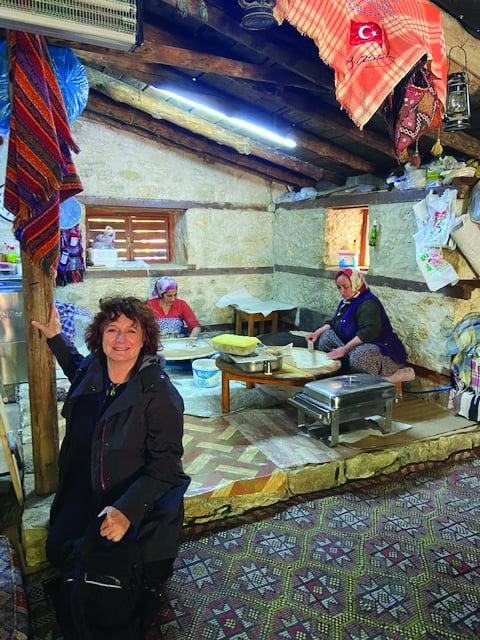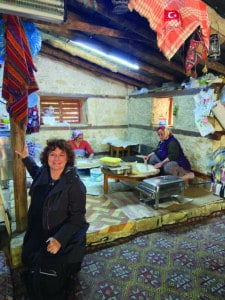Edie Weiss has embraced a life of travel and learned volumes about archeology, food, fashion, and how people relate to one another as a global community. A retired self-employed CPA, she shares what she’s learned about seeing the world and soaking it all in.
Jewish News: When did traveling make such an impact on you?
Edie Weiss: The love of travel has flowed through my family’s blood. As a kid, I would listen to oft-repeated and somewhat embellished stories of a great aunt’s trip to Yugoslavia, one grandmother’s trip to visit relatives in Israel, my parents’ travel around Europe in my dad’s army days, or the other grandmother’s trip to Japan. I spent a teenage summer in Israel, lived some years in Mexico, and did the various cruises around the Caribbean and Mediterranean Seas, but it was not until I was a divorced single mom approaching 50 that the travel bug hit. Overseas travel was a way to spend time with my teenage daughters, as well as broadening all our horizons.
JN: Where was your first major trip?
EW: With the girls in college or beyond, it was time for an “adult” excursion, a comfortable tour to a locale that combined my love of archeology and the touch of the exotic. When the travel agent suggested Egypt, both my sister and I jumped for a trip to commence in three weeks going into the spring of 2011. Yes, we landed in Cairo the day the Arab Spring started in Egypt. We got to see the museums, Luxor, and travel down to Aswan on boat, but as the last tour in each location, we were escorted out by machine guns and the smell of tear-gas. It was a learning experience as to how your fellow travelers support each other in times of stress.
JN: What are your top memorable trips?
EW: Nepal—Call me a product of the ’70s and a fan of Cat Stevens, but I always wanted to see Katmandu. And it was more “out-worldly” and spiritual than I could have ever imagined. The carved wood structures, the temples, and the magnificent scenery. As you fly into the basin of the Himalayas that holds the city, you pass close to Mt. Everest.
Myanmar (Burma)—A seven-hour ride on a rickety boat upriver to the ancient city ruins of Mrauk-U in the Rakhine state (now restricted because of warfare) brought my companion and myself to an island where inhabitants represented 35 different tribes living in grass walled houses on the river. A bit of an ‘Indiana Jones’ adventure.
Uzbekistan—The heart of the Silk Road. The blue tiles of Samarkand. The old Jewish Quarter in Bukhara. Climbing ancient fortresses in the Kyzylkum Desert.
JN: What tips would you give to people traveling to other countries?
EW: Know your limitations. They are not liabilities, just something to work around. (I say this as a 66-year-old woman who has rods in an arm and elbow and a hip replacement from a biking accident many years ago, as well as hearing aids, and, of course glasses.)
Itinerary
Many trips, many prices, many offers. With age, be realistic. A bit more comfort on the trip, bathroom breaks, a good night’s sleep, and mobility challenges are to be considered. Daily hotel changes can be disruptive, long hikes challenging, and country jumping may mean time spent in airports rather than at sights.
Don’t be afraid to travel as a single person, especially on a tour. You will meet great folks along the way and never feel alone.
A good travel agent may save you much time on the phone and tailor your trip to work with your limitations, be they physical or economic. The internet may be a good purchase resource if the trip is simple, but expect long phone waits for changes or problems. Do look at Trip Advisor but remember it is not geared to the senior traveler.
Follow your passion (though you may want to limit trips to two weeks). A boring trip can drag and make you wonder why you ever left beautiful Hampton Roads in the first place.
Safety
Sign up for State Department Advisory and Step Program. Review as you begin to plan your trip.
Travel insurance is important, and make sure it is comprehensive for medical issues.
Carry a cell phone. International plans are around $10 per day. You may need it in an emergency or just for using Google Maps to find a restaurant. Send emails and update photos to worried adult children.
Copy your credit cards, passport, visas, itinerary, and other important documents, and email them to family members securely. Also be able to [get on] the cloud yourself.
Review your specific medical needs. In my case, I bring foldable walking sticks for climbs. (And this is just me: review where Chabad houses are in your destination as they are always a good place for food and assistance.)
Preparation
Find good guidebooks such as Lonely Planet in the library or digitally online to review customs and expectations. Clothing and visas will be discussed, as well as small regional idiosyncrasies such as what hand to accept a card with or how to nod “no.”
Update your apps on your smart phone to include a currency calculator and a language translator (I usually just use my hands a lot and smile).
Take luggage limits seriously, especially as they have changed in recent years. Pack in the zippered cubes to maintain organization. Bring all sizes of Ziplocs for snacks you can take from breakfast, wet clothing, and taking home items. Also, look at electrical adaptors and convertors ahead of time since some countries, such as India, require unusual prongs. Medical supplies should include Imodium and cold medicine, which are hard to find overseas.
Airports are long, and carry-on luggage gets heavy. Small roll-arounds may be too big for some flights and buses. A lightly packed backpack with a day or two of clothing can double as a daypack during a tour and won’t tire you out shlepping.
Shopping
Look at Amazon. The teapot you crave in Uzbekistan is only a few dollars more delivered to your door at home.
Plan what you can use when you get home. Nice silk shirts made to order in Vietnam will be worn once home; the heavy sequined Macedonian groom’s wedding shirt not so much (and still in my closet).
Your kids really don’t want the tchatchkas. They made it clear and will do so again when you bring home the unwanted items for the grandkids. Avoid the urge and keep within luggage weight limits.
Go for the experience! Spend on the African elephant ride in the bush in Zimbabwe. Get lathered and massaged in the Turkish hammam. Snorkel the Great Barrier Reef.
JN: Were you surprised to find there are things we all have in common, no matter where we live?
EW: It should be no surprise, but family is always the number one concern. And mothers always worry about their children, no matter the age. During my recent visit to a family that lives in dug-out caves in Cappadocia, Turkey, the translated conversation evolved from how the family lived there for hundreds of years to the female host’s worry concerning her independent eldest daughter. All the women on my tour could relate.
JN: Do you have a wish list of future trips?
EW: My heritage as a Jewish woman and our people’s history has become the focus of my future trips. A recently booked trip to Romania will take me to the country of birth of a paternal great-grandfather. A trip to Eastern Turkey (my fifth to that country) next May will take me to Mt. Ararat, the traditional birthplace of the Patriarch Abraham and other locations that are cited in the prehistory of the Jewish people. I had to postpone trips to Armenia and Georgia as well as Japan and South Korea due to COVID, so hopefully I will be able to see those countries as well.
JN: Other comments?
EW: Be a TOURIST (respectfully). Chances are you will not blend in and that is okay. Local folks want to tell you their story and certainly, want to hear about yours. With the internet and streaming of Disney+ and Netflix around the world, you won’t be seen as the Ugly American. You will be asked if you know their relative who moved to Brooklyn or Virginia or California.
Smile broadly.


